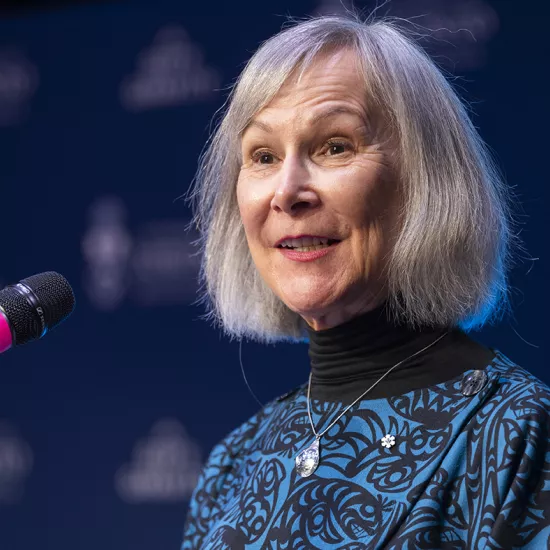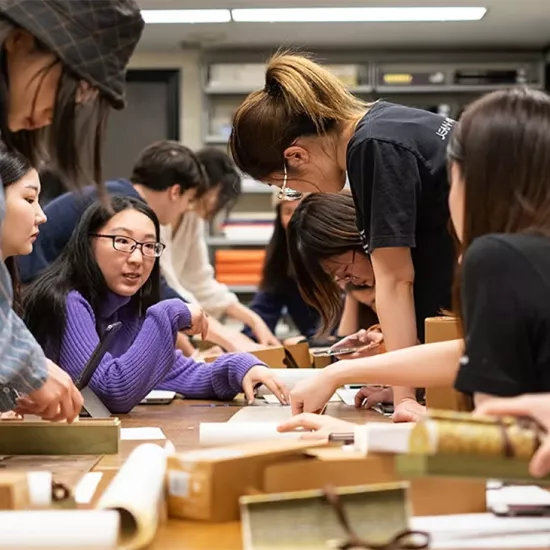Kathi Wilson


Kathi Wilson knew geography was the place for her when she took a class in high school. “I was fortunate to have the most amazing geography teacher, Mr. Lino Fuciarelli, who introduced me to a world of people and places,” says the assistant professor at University of Toronto Mississauga. “I naively thought geography was just about maps and landforms, but geography really came alive in his classes.”
Geography continues to live and breathe for Wilson, who has been a faculty member in the Department of Geography since 2003. Wilson’s current research focuses mainly on the relationship between determinants of health and neighbourhoods. “I’m interested in how places affect health either positively or negatively – for example environmental exposures or access to recreational opportunities – but also how health shapes individuals’ experiences of places,” says Wilson. Her research has evolved into two strands: the first concentrates on issues related to health care access; the second focuses on the role of neighbourhood environments – both physical and social – in determining an individual’s health and well-being.

As part of one of her research projects, Wilson works closely with the Dixie Bloor Neighbourhood Centre in Mississauga. In conjunction with the Healthy City Stewardship Centre (HCSC), which is a World Leadership Award-winning initiative between various Peel-region organizations, the university and the city of Mississauga aimed at improving the health of the people in the area, she is involved with several “interrelated projects that examine the importance of the Dixie Bloor Neighbourhood Centre for shaping immigrant settlement experiences, health status, as well as access to health care and social services.” Wilson feels fortunate to be involved with this program, and to be able to see some of the impact of her research reflected in the community. “I have had the opportunity to embark on a number of projects that will have implications for program and policy development at the local level,” says Wilson.
Wilson is also a supervisor to MA student Jennifer Asanin, a recent U of T Excellence Award recipient, who is currently completing a qualitative study as part of her thesis, which examines the effects on health for unemployed immigrants who have entered Canada under the Skilled Worker Program. “We started looking at the health impacts of not working in their trained field, but also, in some cases, not working at all or taking what immigrants call ‘survival jobs,’” says Wilson. She and Asanin are examining the immigrants own health, but they are also documenting possible consequences for the health of their families.
Wilson has enjoyed how her research on neighbourhoods and health has expanded to include three separate projects with users from the Dixie Bloor Neighbourhood Centre and also how the research has evolved. She feels initially she approached the research projects from an academic angle, but speaking with residents has provided a more thorough, community-based representation of what they regard as important issues; things that are not captured in the literature. She would like to extend the research even further, collaborating with other neighbourhood centres and linking it with some of the HCSC’s Health Plan 2010 goals. In doing so Wilson wants to conduct a longitudinal study on health and neighbourhood environments that would involve data collection at five- and 10-year intervals to see if people’s perceptions of their health, well being and neighbourhoods changes over time.

What has not changed over the years for Wilson is her interest and inspiration for her field of study. Beginning with the first spark of interest ignited in Mr. Fuciarelli’s class in high school, Wilson didn’t hesitate in selecting geography as her major when she started university at McMaster. While pursuing her undergraduate and master’s degrees, she was impressed with the scope of geographical issues she was exposed to – urban planning, retail location and population studies – and she was engaged by the methodological and theoretical debates. It was during Wilson’s final year of study in a class called “Geography of Health and Health Care” that she found her true niche. “Before that time I had not given much thought to how important geography is for health and well being,” says Wilson. “It was at that moment that I decided I wanted to have a career that focused on why certain places and people are healthier than others.”
Wilson feels that being part of the Mississauga campus and her partnerships with the broader Mississauga community fuel her fire for research. “Having strong connections to the community and community-level support to do research is an incredible opportunity,” says Wilson, who is also encouraged by the dedication of the members of HCSC to make Mississauga a healthier place to live. “I look around the HCSC meeting table and see the directors of the school boards, representatives from the hospitals, Peel Region, Peel Police, United Way, Dixie Bloor Neighbourhood Centre, the university, the city and all are committed to the same goal of improving health in Mississauga. This is not something you see in other communities. There’s such a strong relationship here; it’s a great connection, and it’s important for research.”



